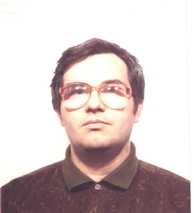
Assistant Professor,
Department of Computer Software, University of Aizu, Japan (by March 31, 2000).
Associate Professor, Faculty of Computer and Information Sciences,
Hosei University, Japan (from April 1, 2000).
Ph.D. 1988 (Moscow Engineering Physics Institute, Russia)
Professor Pasko came to the University of Aizu from the Moscow Engineering Physics Institute (MEPI).
He was a senior scientist at MEPI from 1988 to 1992.
He is a member of the Eurographics Association.
He received First Prize in the National Competition of Young Specialists in Computer Science
in 1984. He was awarded a Diploma of the USSR Academy of Sciences in 1985 and
a medal of the National Exhibition Center in 1987. He is now an Assistant Professor in the Shape Modeling Laboratory.
- Geometric Modeling
- Multidimensional Visualization
- Computer Animation
Geometric images are probably the eldest product of the human brain. In modern
logically-oriented life it is extremely important to keep and develop
this ability. I am convinced that outstanding achievements in science and
technology can only be attained in the balance of logic and geometric reasoning.
There are many ways of modeling geometry by means of computer.
We try to find an approach dealing with geometric objects in the most
simple and
uniform style. Thus, function representation (F-rep) of geometric objects has been
introduced with set-theoretic operations based on the theory of R-functions
recently developed by Russian mathematicians. This representation is independent of
the space dimension.
That is why time-dependent or animated objects can be described in the same
manner, with time being considered as one of the coordinates of space-time.
Many unusual geometric operations like blending, metamorphosis and even "hair growing"
can be functionally described. Sometimes it seems we now have
"experimental geometry"
by analogy with experimental physics, where new results usually have to be
explained from the theoretical point of view. By using more powerful parallel computers and by
adding intellect to artificial actors we will get an instrument
for future creative work in art and design, medicine and industry.
F-rep Home Page presents descriptions of
selected research topics, list of publications, images, and animation.
HyperFun project
provides tools for F-rep modeling using HyperFun language.
-
"
Transformation of functionally defined shapes by
extended space mappings ",
(with V. Savchenko),
The Visual Computer, Vol. 14, No. 5/6, pp. 257-270. (1998)
- "
Function representation for sweeping by a moving solid ",
(with A. Sourin ),
IEEE Transactions on Visualization and Computer Graphics ,
Vol.2, No.1, pp.11-18. (1996)
- "
Using real functions with application to hair modelling ",
(with A. Sourin and V. Savchenko ),
Computers and Graphics , Vol.20, No.1, pp.11-19. (1996)
- "
Function representation
in geometric modeling: concepts, implementation and applications ",
(with V. Adzhiev, A. Sourin and V. Savchenko),
The Visual Computer, Vol. 11, No. 8,
pp. 429-446. (1995)
- "
Function representation
of solids reconstructed from scattered surface points and contours ",
(with V. Savchenko, O. Okunev and T. Kunii),
Computer Graphics Forum, Vol.14, No.4,
pp. 181-188 (1995).
- "
Geometric modeling in the analysis of trivariate functions ",
(with V. Pilyugin and V. Pokrovskiy),
Computers & Graphics,
Vol. 12, Nos. 3/4, pp. 457-465 (1988).
Outgoing
e-mail: pasko@acm.org
